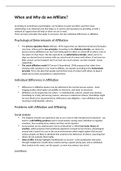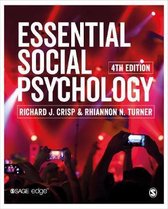When and Why do we Affiliate?
According to evolutionary psychologists, our tendency to seek out others and form close
relationships is an inherited trait that helps us to survive and reproduce by providing us with a
network of support that will help us when we are in need.
There are basic principles that apply to everyone, but also individual differences in affiliation
Psychological Determinants of Affiliation
The privacy regulation theory (Altman, 1975) argues that our ideal level of privacy fluctuates
over time, influenced by two principles. According to the dialectic principle, our desire for
privacy (versus affiliation) can vary from being open to others or closed off to others, even in
the space of a few hours. We also operate by an optimization principle, where we try to
align our desired level of contact with our actual level of contact with others. If we have too
little contact, we feel isolated, but if we have too much contact, we feel crowded - shows
subjectivity.
The social affiliation model (O’Connor & Rosenblood, 1996) proposes that rather than
showing wide variations in our need to affiliate, we operate according to the homeostasis
principle. This is the idea that people control their level of contact with others to keep it
stable and as close as possible to a desired level.
Individual Difference in Affiliation
Differences in affiliative desires may be reflected in the central nervous system - brain
imaging studies show higher arousability in introverts, and lower in extroverts
Affiliation can be shaped also by culture - in individualistic cultures, people may develop
friendships in a fairly self-serving manner, whereas in collectivist cultures, friendships might
be more likely to be characterized by selflessness and obligation - more affiliation but less
meaning in individualistic cultures.
Problems with Affiliation and Affiliating
Social Anxiety
The negative emotion we experience due to our concern with interpersonal evaluation - can
lead to a self-fulfilling prophecy due to social anxiety causing more attention to negative
emotions, thus creating more anxiety and thus social rejection.
Social anxiety can be understood in terms of Schachter’s (1964) two factor theory of
emotion, which proposes that emotional experience is based on two factors, physiological
arousal and a search for cues in the social environment which might explain that arousal -
anxious people are likely to attribute that anxiety to the behaviour of others, assuming that
others do not evaluate them highly.
Olson (1988): findings highlight misattribution to arousal - some participants told noise
through headphones would induce anxiety during a speech giving task, and so attributed
their anxiety to the noise, not the speech, so were less anxious (see chart)
Loneliness
, Williams and Solano (1983) found that although lonely students did not differ from non-
lonely students in terms 700 of how many best friends they had, they perceived a lack of
intimacy with their friends - findings indicate that it is poor quality rather than a low quantity
of relationships which contributes towards feeling lonely.
3 main factors to loneliness: lonely people are more likely to have certain personality traits
(depression, shyness etc), lonely people spend less time with women regardless of gender,
and lonely people have certain social-cognitive tendencies, for example, judging others
harshly.
Loneliness is more likely to be chronic if the person puts more blame on themselves for their
loneliness, rather than attributing it to circumstances.
Ostracism
The experience of being excluded or ignored by another individual or group - Williams
argued that ostracism threatens four fundamental human needs: belonging, control, self-
esteem and meaningful existence.
Ostracism has an incredibly powerful effect on us, regardless of who is doing the ostracizing
(and regardless of whether we would even want to be a member of their group) - An fMRI
study showed that ostracism led to the same areas of the brain being activated as when we
are physically hurt. Shows an evolutionary component to ostracism, that seems to be overly
sensitive and hardwired.
Friendship
Social Penetration Theory
A developing friendship is guided by a norm of self-disclosure reciprocity. Individuals match
one another’s level of disclosure, only revealing information of greater intimacy when the
other person does so.
Once the relationship has reached a high level of intimacy, the level of self-disclosure levels
off and is replaced by an exchange of support and understanding.
When a relationship is in trouble, depenetration occurs, a reverse of the escalating self-
disclosure process that occurs in the development of friendship.
However, it has been found that some friends disclose information instantly and 'click' - also
cultural differences: individualistic cultures tend to disclose more about themselves.
Gender Differences in Friendships
Intimacy
Women’s friendships tend to be more intimate and emotionally involved than men’s
friendships.
found that women self-disclose more than men, especially in intimate relationships.
Specifically, they showed that women disclose more than men to same-sex friends, but
there was no gender difference in disclosure to male friends.
Men may avoid self disclosure to avoid negative evaluations from both men and women.
Physical Contact
Men engage in less physical contact with same-sex friends than do women. In North America
and the UK, heterosexual men and women view hugging and other forms of physical






